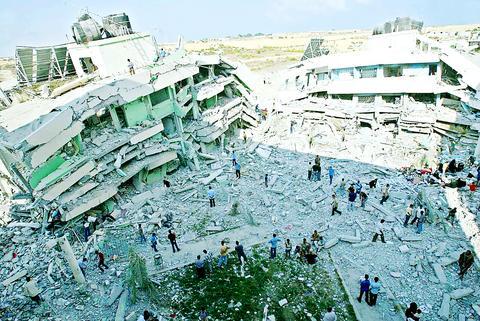This week's suicide attack in southern Israel has sparked a war of words between Israel and Syria and increased pressure to finish the West Bank barrier that many Israelis believe saves lives, regardless of international condemnation. Also Thursday, four Palestinians were killed in a Gaza town in clashes after Israeli forces found a tunnel leading to a Jewish settlement.
As Israel mourned its 16 dead from Tuesday's twin bus bombings in Beersheba claimed by Hamas militants, officials ratcheted up their rhetoric against Syria, hinting at possible military action.

PHOTO: EPA
Syria and Hamas, apparently fearful of an Israeli strike, accused Israel of trying to aggravate tensions in the Middle East.
Although no Israeli strike appeared imminent -- security officials haven't even begun discussing the possibility -- the heated rhetoric underscored Israel's growing impatience with Syrian support for Palestinian militants.
Prime Minister Ariel Sharon told the Israeli president that Tuesday's bus bombings -- the deadliest attack in Israel in nearly a year -- were carried out on direct orders from Hamas leaders in Damascus, the Syrian capital.
A senior adviser to Sharon, Raanan Gissin, warned that neither Hamas nor Syria, which is now home to the Hamas top leadership, are "immune" to an Israeli strike.
And Foreign Minister Silvan Shalom warned that Syria's support for terrorists "will have very clear consequences."
However, the chief of Israeli military intelligence, in an interview with Channel 10 TV, refused to draw a straight line from Beersheba to Syria.
"We did not directly connect the terror attack that was carried out in Beersheba to the [Hamas] headquarters in Damascus," Major General Aharon Zeevi-Farkash said, while adding that there is "wide and comprehensive support from Damascus" for militants in the West Bank and Gaza.
Syrian Foreign Minister Farouk al-Sharaa was quoted as saying the threats would "worsen the already aggravated situation in the region." Ahmed Haj Ali, an adviser to the Syrian information minister, said Syria is taking the Israeli threats "seriously."
Hamas issued its own statement from Damascus, accusing Israel of trying to provoke a confrontation and insisting that its actions against Israelis are planned and executed from the Palestinian territories, not Syria.
Israel last struck a target inside Syria on Oct. 5, 2003, when its planes bombed a training camp belonging to Islamic Jihad outside Damascus.
Israel's most obvious target in Syria today would be Hamas leader Khaled Mashaal, who survived an Israeli assassination attempt in Jordan in 1997.
Israel has held Syria partly responsible for years of Hezbollah raids from Lebanon, where Syria maintains a large military presence. In practice, however, Israel has been hesitant to clash with Syria, and the border has been calm for decades.
Analyst Efraim Halevy, a former Mossad intelligence chief and diplomat, said if there is further violence traced to Syria, "I don't think Israel will necessarily play the game the way it's been playing it up to now."

A fire caused by a burst gas pipe yesterday spread to several homes and sent a fireball soaring into the sky outside Malaysia’s largest city, injuring more than 100 people. The towering inferno near a gas station in Putra Heights outside Kuala Lumpur was visible for kilometers and lasted for several hours. It happened during a public holiday as Muslims, who are the majority in Malaysia, celebrate the second day of Eid al-Fitr. National oil company Petronas said the fire started at one of its gas pipelines at 8:10am and the affected pipeline was later isolated. Disaster management officials said shutting the

US Vice President J.D. Vance on Friday accused Denmark of not having done enough to protect Greenland, when he visited the strategically placed and resource-rich Danish territory coveted by US President Donald Trump. Vance made his comment during a trip to the Pituffik Space Base in northwestern Greenland, a visit viewed by Copenhagen and Nuuk as a provocation. “Our message to Denmark is very simple: You have not done a good job by the people of Greenland,” Vance told a news conference. “You have under-invested in the people of Greenland, and you have under-invested in the security architecture of this

Japan unveiled a plan on Thursday to evacuate around 120,000 residents and tourists from its southern islets near Taiwan within six days in the event of an “emergency”. The plan was put together as “the security situation surrounding our nation grows severe” and with an “emergency” in mind, the government’s crisis management office said. Exactly what that emergency might be was left unspecified in the plan but it envisages the evacuation of around 120,000 people in five Japanese islets close to Taiwan. China claims Taiwan as part of its territory and has stepped up military pressure in recent years, including

UNREST: The authorities in Turkey arrested 13 Turkish journalists in five days, deported a BBC correspondent and on Thursday arrested a reporter from Sweden Waving flags and chanting slogans, many hundreds of thousands of anti-government demonstrators on Saturday rallied in Istanbul, Turkey, in defence of democracy after the arrest of Istanbul Mayor Ekrem Imamoglu which sparked Turkey’s worst street unrest in more than a decade. Under a cloudless blue sky, vast crowds gathered in Maltepe on the Asian side of Turkey’s biggest city on the eve of the Eid al-Fitr celebration which started yesterday, marking the end of Ramadan. Ozgur Ozel, chairman of the main opposition Republican People’s Party (CHP), which organized the rally, said there were 2.2 million people in the crowd, but